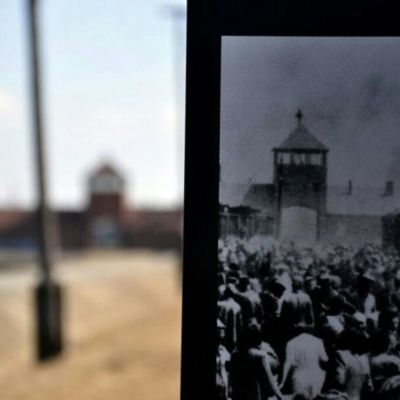The official podcast of the Auschwitz Memorial. The history of Auschwitz is exceptionally complex. It combined two functions: a concentration camp and an extermination center. Nazi Germany persecuted various groups of people there, and the camp complex continually expanded and transformed itself. In the podcast "On Auschwitz," we discuss the details of the history of the camp as well as our contemporary memory of this important and special place. We kindly ask you to support our mission and share our podcast in social media. Online lessons: http://lesson.auschwitz.org
http://www.auschwitz.org
Gesamtlänge aller Episoden: 1 day 22 minutes
"The Zone of Interest" - discussion with the filmmakers
On 15 February 2024, the Polish premiere of the film 'The Zone of Interest,' directed and written by Jonathan Glazer, was held at the Auschwitz Museum. The film, depicting the family life of Auschwitz camp commandant Rudolf Höss, was awarded the Grand Prix at the Cannes Film Festival last year. It also received two Oscars...
episode 44: "On Auschwitz" (44): Women at Auschwitz
The Auschwitz camp was established in June 1940 for male prisoners. The first groups of women were incarcerated by the Germans more than a year and a half later - at the end of March 1942. Dr. Wanda Witek-Malicka and Teresa Wontor-Cichy of the Museum Research Centre talk about the reasons for the creation of the women's camp in Auschwitz and the circumstances surrounding it...
episode 43: "On Auschwitz" (43): the film Chronicle of liberation of Auschwitz
The Auschwitz camp was liberated on January 27, 1945, by soldiers of the Red Army. Well-known are the scenes captured by Soviet cameramen, which, although not showing the exact moment of liberation, are important documents revealing the crimes committed by the Germans in Auschwitz.
It is essential to remember that some of the film material was created for propaganda purposes...
episode 42: "On Auschwitz" (42): Death Marches from Auschwitz towards Wodzisław Śląski and Gliwice
On January 17, 1945, SS men began the evacuation of the Auschwitz camp. Approximately 56,000 prisoners – men and women marched, under armed escort, from different parts of the Auschwitz camp complex, towards Wodzisław Śląski and Gliwice. Thousands of people, during the so-called Death Marches, lost their lives. Dr. Jacek Lachendro and Teresa Wontor-Cichy from the Research Center of the Auschwitz Museum talk about details of those tragic events...
episode 41: "On Auschwitz" (41): Art at Auschwitz
The Auschwitz Memorial and Museum is in possession of the largest collection of art related to the Auschwitz camp. This collection is unique on a world scale. The artworks created in conditions of extreme danger are an extraordinary document of history and time that still stir the emotions to this day.
They enable one to discover the feelings and emotions, difficult to reconstruct today, that accompanied the inmates on a daily basis...
episode 40: "On Auschwitz" (40): Why prisoners of Auschwitz did not start a revolt?
One of the important questions about Auschwitz is why the prisoners, who outnumbered the SS guards, did not make an attempt of a general revolt or uprising.
Dr. Piotr Setkiewicz and Dr. Wanda Witek-Malicka of the Museum Research Center discuss the first encounter of prisoners with the realities of the camp, their adaptation to the conditions of existence and the possibilities of initiating a revolt among the prisoners...
episode 39: "On Auschwitz" (39): Keeping the functioning of Auschwitz in secrecy
Although the SS took various measures to keep the functioning of the camp secret, especially when Auschwitz became both a concentration camp and extermination center, news about the camp got out.
Dr. Piotr Setkiewicz, the head of the Museum Research Centre, talks about how information about Auschwitz could reach the world.
episode 38: "On Auschwitz" (38): Women supervisors at Auschwitz
Over two hundred women served the SS in KL Auschwitz. They were divided into three groups according to the duties they performed: the biggest group constituted the so-called Aufseherinnen, whose main task was to watch over women prisoners; the second group was formed by women employed in communication services described as SS-Helferinnen working in SS headquarters offices as radiotelegraph operators, stenographers and telephone operators; the last group consisted of nurses.
Dr...
episode 37: "On Auschwitz" (37): Different cases of organized resistance at Auschwitz
In the history of Auschwitz, there were instances when prisoners tried to resist. The most famous event is the Sonderkommando revolt that took place at Auschwitz II-Birkenau on 7 October 1944. This story is told in episode 21 of our podcast.
However, there were other cases of prisoners organising resistance in order to attack SS members, or to escape...
episode 35: "On Auschwitz" (36): The story of Sophie Stippel, the cook of Auschwitz commandant Rudolf Höss
One of the prisoners in the first transport of women to Auschwitz - 999 women transferred from Ravensbrück concentration camp in March 1942 - was Sophie Stippel. She was registered as prisoner number 619.
She was arrested because she belonged to the group of Jehovah's Witnesses.
A few days after arrival, Sophie was employed as a domestic helper in the villa of the camp commandant, Rudolf Höss, which probably saved her life...
